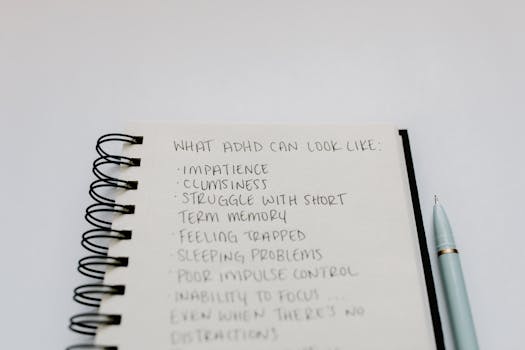The ADHD Brain: Lack of Self Knowledge
So many adult clients I meet with have no idea that (or the extent to which) their ADHD brain has been impacting the way they think, behave and feel––and how they show up in their relationships. I have a keen eye for picking up on the signs. The ADHD brain comes with plenty of challenges but mostly joys and gifts. Watching the self awareness light bulb illuminate in my clients, session after session, reinforces how powerful it is to understand one’s own brain and nervous system. Most with an ADHD brain have always felt different but have lived in the dark with little to no understanding of why they haven’t fit the standard mold. The lack of societal- and self-knowledge has only added to what can already feel overwhelming, confusing, and frustrating with this divergent neurology.
Awareness is Growing
Within the body of your blog post lies the heart of your message. Break down your content into coherent sections, each with a clear heading that guides readers through the narrative. Dive deep into each subtopic, providing valuable insights, data, and relatable examples. Maintain a logical flow between paragraphs using transitions, ensuring that each point naturally progresses to the next. By structuring your body content effectively, you keep readers engaged and eager to learn more.
What Is ADHD? How You Think, Behave, and Feel
Common signs of ADHD include inattention, inconsistent attention, distractibility, indecisiveness, disorganization, time blindness, behavioral impulsivity, forgetfulness, procrastination, misplacing things and difficulty making transitions. Frequently overlooked signs include rejection sensitivity dysphoria, emotion dysregulation, and hyperfocus.
Harnessing Your Adult ADHD
- Learn about yourself and ADHD
The first step of making the most of your own neurology is to understand it. Learn about yourself. Take some ADHD assessments. You can share these initial online assessments with a psychologist, psychiatrist and/or professional counselor who specialize in ADHD and offer assessments with greater validity. Speak with a trusted therapist who will help you sort out your diagnosis and dig into the amazing resources that now exist.
2. Create Your Owner’s Manual – make friends with structure and boundaries
Likely, you are already implementing strategies without realizing you’ve done so. The more awareness you have about the way you behave, think and feel, this can help inform the areas you need to employ more tools. Some common strategies center around creating structure and boundaries. ADHD individuals resist structure but need to make this their best friend. Many work with an accountabilibuddy, friend, coach, professional organizer and/or therapist to help keep to their goals.
Take each challenge that you find gets in the way of your gifts and use what you know is best for you which can mean learning new strategies. Below are a few examples of tools for specific liabilities of an ADHD brain:
a) distractability – Identify the best times of day that support your focus. Find settings that keep you from inattention, like a coffee shop, your office instead of the house. Change it up to keep it interesting. Bring people and systems into your life to help you practice digital minimalism. Keep your phone far from the bedroom overnight.
b) procrastination – set a goal for a good habit, like bedtime, and pair up with a buddy, aka accountabilibuddy, personal coach or professional organizer. The shared support and the competition of checking in will keep it more intriguing. Keep your goals bite size.
c) disorganization – Similar to procrastination, tools for organization will tilt toward structure. Hiring a coach or professional organizer for your home, your finances, your creative projects must be accepted as essential and integrated into your life. Many benefit from medication to help offset the weaker aspects of the executive function part of the brain.
d) Rejection Sensitivity Dysphoria (RSD) – This is a common struggle with ADHD neurology which can mean extreme emotional sensitivity and emotional pain, in general––but especially related to rejection or fear of rejection. Your owner’s manual should definitely include tools and support for learning how to regulate your nervous system and intense emotions. Cognitive and somatic-based therapies can help you retrain and take charge of your mind and body.
d) all of your ADHD challenges – good sleep hygiene and self care and reducing your digital time is vital. Get outside and move your body!
3. Enlist Outside Support
As mentioned above, and especially if your ADHD creates a high degree of impairment in your life, I can’t emphasize enough how vital it is to receive outside support. As I mentioned above, support might mean a coach, personal organizer, tutor, bookkeeper, trainer. Please accept the reality of your unique neurology and give this to yourself. You deserve it and the world needs your first exceptional (gifts) to shine lest your second exceptional (the liabilities) will thwart your potential.
4. Consider Medication
Many find that taking a non-stimulant or stimulant medication can help balance out their neurology to be on the playing field with the non-ADHD individuals. While some people misuse these medications that can be addicting, when used properly, they can really make a positive difference.
5. Invest In Your Self Worth and Embrace Your Gifts
Many with ADHD walk around with shame. Those who are undiagnosed are more vulnerable to self worth issues. Many have been blamed or criticized for how they operate, how emotional they are, judged for being irresponsible, inconsistent or not trying hard enough. Self awareness is a huge step and can relieve the feeling that you are broken or doing something wrong all the time. These shaming perceptions of oneself are merely an illusion covering the true wholeness that is the true you—now and always.
Learning about self compassion and self worth can pave the way for developing a kinder, more loving relationship with yourself.


